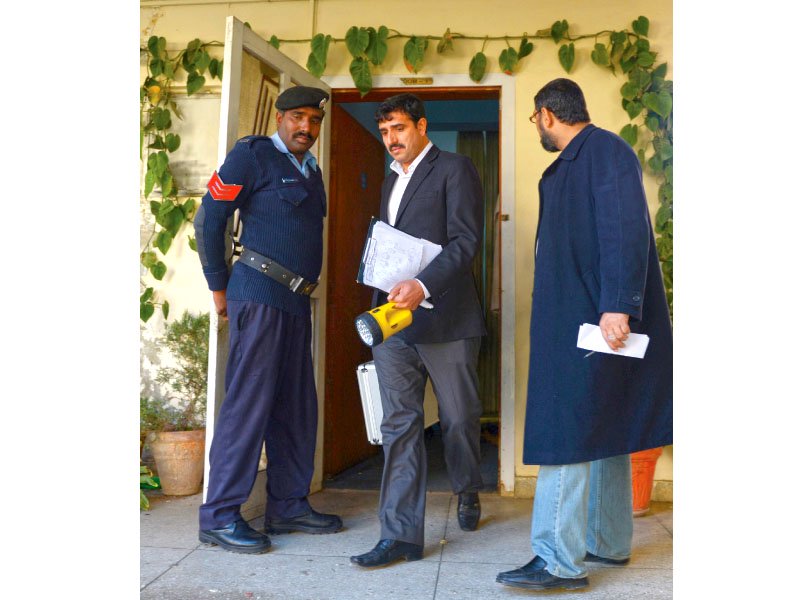
National Accountability Bureau (NAB) officer Kamran Faisal committed suicide, a five-member board of doctors has declared, upholding the result of an initial autopsy report.
The final report, prepared and handed over to the Secretariat Police on Saturday, ruled out the possibility of the NAB officer being tortured or receiving any injury that could have caused his death.
“In its summary, the report clearly stated that Faisal’s death was suicidal in nature,” said an official of the police, who chose to remain anonymous as he was not authorised to discuss the confidential report.
Faisal, who was an investigating officer in the high-profile rental power plants case, which involved the prime minister, was found hanging from a ceiling fan on January 18.
The final autopsy report will be presented before the Supreme Court, which is currently hearing a case related to the officer’s death, on the next date of hearing.
The five-member board of Poly Clinic Hospital doctors, headed by Dr IU Baig, held three meetings after receiving the forensic report from the Punjab Forensic Science Agency (PFSA) Lahore on Wednesday. The board also consulted the head of the forensic department in the Rawalpindi Medical College hospital on the report, poly clinic spokesperson Dr Sharif Asturi told the media. However, he added he had no knowledge of the contents of the report as it was sealed by the board.
Faisal’s family had strongly opposed the initial autopsy report which ruled his death a suicide, saying he would never take his own life. The officer’s father had claimed that his son had “torture” marks on his hands and alleged foul play in his death.

The PFSA forensic report, however, ruled out that Faisal was given poison as no intoxicating material was found during the chemical analysis of his body’s organs. While the report mentioned that some marks were found on Faisal’s arm, it declared them not of serious nature.
“Some marks were found on his arm at the time of exhumation but were not visible at the time of post-mortem. They are not severe enough to disable any healthy person (to make him unconscious),” a police official, quoting from the final report, told The Express Tribune.
The PFSA report also mentioned that some DNA sample found on the rope with which the NAB officer was found hanged with the ceiling fan did not match with his neck. However, the police officer termed it as “nothing alarming”. “The rope was not properly preserved for the purpose of DNA as it passed through many hands that helped remove it from the dead officer’s neck, the police officer added.
The PFSA forensic report includes neither an analysis of Faisal’s clothes nor fingerprints that were taken from the scene.
After Faisal’s family and his colleagues raised doubts over circumstances surrounding his death, the PFSA, in a controversial move, exhumed his body, obtained his clothes and visited the crime scene for further analysis.
The Secretariat police also sent some samples of the NAB officer’s body abroad for an examination, the results of which are still awaited.
Published in The Express Tribune, February 17th, 2013.
COMMENTS (7)
Comments are moderated and generally will be posted if they are on-topic and not abusive.
For more information, please see our Comments FAQ
1732013245-0/now-you-see-me-(1)1732013245-0-405x300.webp)
1730959638-0/trump-(19)1730959638-0-165x106.webp)





1732011525-0/Express-Tribune-(8)1732011525-0-270x192.webp)
1732004108-0/Express-Tribune-(5)1732004108-0-270x192.webp)
1732000275-0/Untitled-design-(9)1732000275-0-270x192.webp)







1.Just because someone takes anti-depressants does not mean they are predisposed to committing suicide. 2.Clearly in a country as rough as Pakistan his enemies might have known this as his weakness and used it to stage a murder. 3.Looking from the outside everyone knows how corrupt the Pakistani police are and so their evidence is neither here nor there. 4.Forensic science in Pakistan is prehistoric. Everyone knows they washed away the blood of Benazir Bhotto before any investigation could take place. It was shown live on BBC TV. One can only imagine how much the authorities tinkered with the evidence scene in this case. 5.Because the case was politically sensitive I think an independent International Criminal Court trial might be the only real way of bringing justice now.
ISI and MI (Military intelligence) murdered him!!
Would any sane person believe this?
People of Pakistan particularly the family of the deceased are not prepared to believe the doctors' verdict. There is definitely some thing fishy about this whole affair.
This officer is guilty of contempt as his or their report isnot what chief justice wanted
The smoking gun is right here, which indicates the identity of the murderer perhaps.
People have already made up their minds no matter what the team of doctors or experts say. In Pakistan we get enough exercise by jumping to conclusions. Let the high judiciary give its verdict and they are no govt fans.